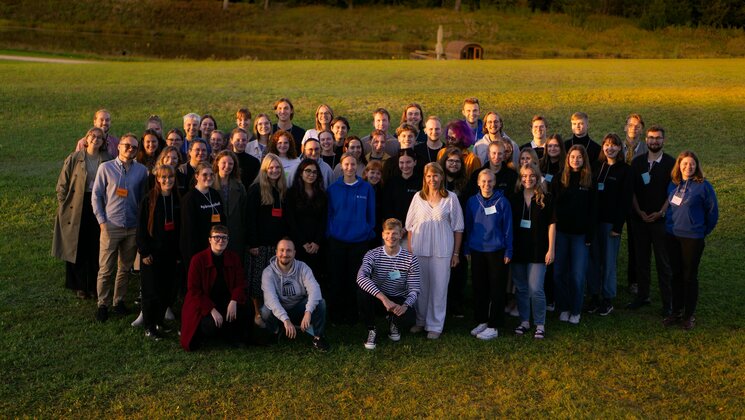-
Faculty of Arts and HumanitiesJakobi 2, r 116-121 51005 Tartu linn, Tartu linn, Tartumaa ESTJakobi 2 51005 Tartu linn, Tartu linn, Tartumaa ESTJakobi 2, IV korrus 51005 Tartu linn, Tartu linn, Tartumaa ESTJakobi 2, III korrus, ruumid 302-337 51005 Tartu linn, Tartu linn, Tartumaa ESTÜlikooli 16 51003 Tartu linn, Tartu linn, Tartumaa ESTLossi 3 51003 Tartu linn, Tartu linn, Tartumaa ESTÜlikooli 18 50090 Tartu linn, Tartu linn, Tartumaa ESTPosti 1 71004 Viljandi linn, Viljandimaa ESTJakobi 2 51005 Tartu linn, Tartu linn, Tartumaa ESTJakobi 2 51005 Tartu linn, Tartu linn, Tartumaa ESTFaculty of Social SciencesLossi 36 51003 Tartu linn, Tartu linn, Tartumaa ESTJakobi 5 51005 Tartu linn, Tartu linn, Tartumaa ESTLossi 36, ruum 301 51003 Tartu linn, Tartu linn, Tartumaa ESTNarva mnt 18 51009 Tartu linn, Tartu linn, Tartumaa ESTNäituse 2 50409 Tartu linn, Tartu linn, Tartumaa ESTNäituse 20 - 324 50409 Tartu linn, Tartu linn, Tartumaa ESTLossi 36 51003 Tartu linn, Tartu linn, Tartumaa ESTRaekoja plats 2 20307 Narva linn, Ida-Virumaa ESTRingi 35 80012 Pärnu linn, Pärnu linn, Pärnumaa ESTLossi 36 51003 Tartu linn, Tartu linn, Tartumaa ESTLossi 36 51003 Tartu linn, Tartu linn, Tartumaa ESTFaculty of MedicineRavila 19 50411 Tartu linn, Tartu linn, Tartumaa ESTBiomeedikum, Ravila 19 50411 Tartu linn, Tartu linn, Tartumaa ESTNooruse 1 50411 Tartu linn, Tartu linn, Tartumaa ESTL. Puusepa 1a 50406 Tartu linn, Tartu linn, Tartumaa ESTL. Puusepa 8 50406 Tartu linn, Tartu linn, Tartumaa ESTRavila 19 50411 Tartu linn, Tartu linn, Tartumaa ESTUjula 4 51008 Tartu linn, Tartu linn, Tartumaa ESTRavila 50411 Tartu linn, Tartu linn, Tartumaa ESTRavila 19 50411 Tartu linn, Tartu linn, Tartumaa ESTFaculty of Science and TechnologyVanemuise 46 - 208 51003 Tartu linn, Tartu linn, Tartumaa ESTNarva mnt 18 51009 Tartu linn, Tartu linn, Tartumaa ESTRiia 23b/2 51010 Tartu linn, Tartu linn, Tartumaa ESTRavila 14a 50411 Tartu linn, Tartu linn, Tartumaa ESTNarva mnt 18 51009 Tartu linn, Tartu linn, Tartumaa ESTRiia 23, 23b - 134 51010 Tartu linn, Tartu linn, Tartumaa ESTObservatooriumi 1 61602 Tõravere alevik, Nõo vald, Tartumaa ESTNooruse 1 50411 Tartu linn, Tartu linn, Tartumaa ESTJ. Liivi tn 2 50409 Tartu linn, Tartu linn, Tartumaa ESTVanemuise 46 51003 Tartu linn, Tartu linn, Tartumaa ESTVanemuise 46 51003 Tartu linn, Tartu linn, Tartumaa ESTArea of Academic SecretaryLossi 3 51003 Tartu linn, Tartu linn, Tartumaa ESTUppsala 6, Lossi 36 51003 Tartu linn, Tartu linn, Tartumaa ESTArea of Head of FinanceÜlikooli 17 51005 Tartu linn, Tartu linn, Tartumaa ESTArea of Director of AdministrationÜlikooli 18A (III korrus) 51005 Tartu linn, Tartu linn, Tartumaa ESTÜlikooli 18, ruumid 102, 104, 209, 210 50090 Tartu linn, Tartu linn, Tartumaa ESTArea of Vice Rector for DevelopmentNarva mnt 18 51009 Tartu linn, Tartu linn, Tartumaa ESTVanemuise 46 51003 Tartu linn, Tartu linn, Tartumaa ESTLossi 25 51003 Tartu linn, Tartu linn, Tartumaa ESTArea of RectorArea of Vice Rector for Academic AffairsUppsala 10 51003 Tartu linn, Tartu linn, Tartumaa ESTÜlikooli 18b 51005 Tartu linn, Tartu linn, Tartumaa ESTArea of Vice Rector for ResearchW. Struve 1 50091 Tartu linn, Tartu linn, Tartumaa EST
The Centre for Digital Text Scholarship is hiring!

The Centre for Digital Text Scholarship (DigiTS), operating under the Centre for Digital Humanities at the Institute of Estonian and General Linguistics, is launching a call for applications for three research fellows (post-docs) and one junior research fellow (PhD student) in Digital Humanities.
DigiTS is a five-year project funded by the European Union. The aim of DigiTS is to conduct cutting-edge research using modern digital methods to analyze textual data in the fields of humanities and social sciences. To this end, a new interdisciplinary research group will be established at the Institute of Estonian and General Linguistics at the University of Tartu, and both experienced researchers as well as PhD students are invited to join. The center is led and the team is composed by visting professor Maciej Eder, who will be supported by professor Liina Lindström, the head of the Institute of Estonian and General Linguistics, and Joshua Wilbur, lecturer in digital linguistics.

Open vacancies
Researchers experienced in digital humanities are invited to apply for the position of research fellow in digital humanities until June 2. Candidates are expected to be able to carry out research and development activities in the fields of digital humanities, computational linguistics, computational literary studies, digital history research, or other related fields, and have previous international-level research experience. Sufficient technical skills are required to apply digital humanities tools and methods, such as programming (e.g., Python or R), quantitative methods, inferential statistics, digital tools, etc. A strong candidate will also have teaching experience at a higher education level and experience in supervising students. More information on the application requirements and job duties can be found on the university’s website.
In addition to the three digital humanities researchers, DigiTS is also looking for a junior researcher (PhD student) to join the research team. PhD applicants must hold a master's degree in humanities or social sciences and have experience analysing text-based data using digital tools. Experience with programming languages (such as Python or R) is also required. The successful candidate will work as a junior researcher at the Institute of Estonian and General Linguistics, but their specific PhD focus will depend on their research topic. If interested in applying, please contact Professor Maciej Eder or Professor Liina Lindström in advance. The application period will last from May 1-15 for international candidates and from June 1-15 for local candidates. Applications should include a proposal for the PhD thesis, along with other necessary documents. Detailed information can be found on the university’s website.
In addition to the project-funded junior researcher position, the Institute of Estonian and General Linguistics is also seeking candidates for five other state-funded junior researcher positions. Successful candidates may also be involved in the work of DigiTS if their research topics align with the digital humanities field. More information can be found under the sections "Finno-Ugric studies" and "Linguistics" on the university’s website.
Additional information about the project is available on the website of the Centre for Digital Humanities.

Read more similar news





